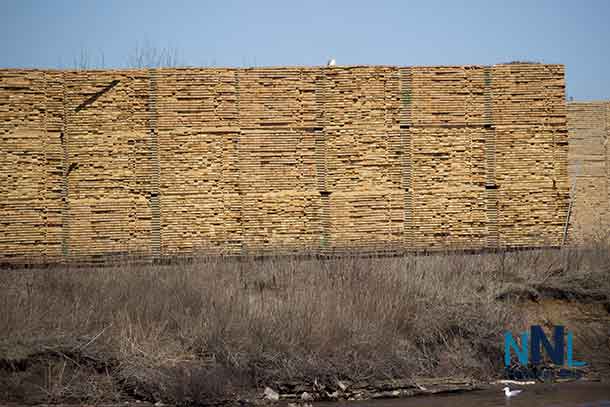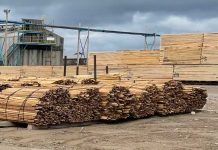
OTTAWA – BUSINESS – The Trump Administration in the United States has imposed a new set of tariffs on Canadian Softwood Lumber.
Jim Carr, Minister of Natural Resources, and the Honourable Chrystia Freeland, Minister of Foreign Affairs, today issued the following statement following the imposition by the U.S. Department of Commerce of duties on imports of certain Canadian softwood lumber products into the United States:
“Canada’s forest industry sustains hundreds of thousands of good, middle-class jobs in communities across our country. Many regions across Canada depend on its continued success. The forest industry is one of the most innovative sectors of our economy, developing new products and expanding its markets overseas while ensuring our environment is protected for future generations.
“The Government of Canada disagrees strongly with the U.S. Department of Commerce’s decision to impose an unfair and punitive duty. The accusations are baseless and unfounded.
“This decision will negatively affect workers on both sides of the border, and will ultimately increase costs for American families who want to build or renovate homes. The U.S. National Association of Home Builders has calculated that a $1,000 increase in the cost of a new house would put home ownership beyond the reach of more than 150,000 American families, and jeopardize thousands of jobs in the American home construction industry.
“The Government of Canada will vigorously defend the interests of the Canadian softwood lumber industry, including through litigation. In ruling after ruling since 1983, international tribunals have disproved the unfounded subsidy and injury allegations from the U.S. industry. We have prevailed in the past and we will do so again.
SUPPORT FOR WORKERS, COMMUNITIES, AND INDUSTRY
“The Government of Canada is taking immediate action to help affected companies, workers, and local communities. Now that the U.S. decision to impose preliminary countervailing duties has been confirmed, Minister Carr is re-convening the Federal-Provincial Task Force on Softwood Lumber this week to examine additional measures.
“The task force was formed to share information and analyze and assess the needs of forest workers and communities. The upcoming meeting will build on the progress we have made through this federal-provincial collaboration on the softwood lumber file.
Immediate action includes:
- Ensuring companies take full advantage of existing financing initiatives under the Business Development Bank of Canada and Export Development Canada, which offer a range of financial services to Canadian businesses on commercial terms. These initiatives are available to exporters of all sizes and can assist companies looking to make capital investments, expand market opportunities, and diversify with confidence into new markets.
- Promoting the use of Canadian wood right here at home. Budget 2017 provided $40 million for increasing wood use in Canada, allowing Canada to continue its world leadership in tall wood building development, partnering with industry and the provinces to build on successes such as the 18-storey University of British Columbia’s Brock Commons residence building, the tallest wood building in the world.
- Actively working to help the forestry industry to access new markets. International Trade Minister François-Philippe Champagne is currently with a delegation of Canadian lumber representatives in China, promoting Canadian products. Minister Carr will travel to China in June with forestry leaders, to build on this momentum. Minister Jean-Yves Duclos is currently in the United Kingdom and Europe promoting Canadian wood.
- Employment and Social Development Canada stands ready to provide essential services to support workers who may be negatively affected. This support includes employment insurance and career counselling, as well as retraining and skills development programs that are delivered at the provincial level.
- Indigenous workers will have access to services through the Aboriginal Skills Employment and Training Strategy program. Currently, ESDC transfers nearly $3 billion annually to provinces through Labour Market Transfer Agreements, as well as an additional $2.7 billion over six years announced in Budget 2017.
SEEKING A LONG-TERM AGREEMENT
“Canada will continue to press their American counterparts to rescind this unfair and unwarranted trade action. We are committed to working with the U.S. Administration to achieve a durable solution.
“Canada has put forward a number of reasonable proposals to the current U.S. administration that is responsive to views expressed by U.S. industry. These proposals ensure security of supply at fair prices to U.S. consumers and U.S. companies that rely on Canadian imports.
“We remain confident that a negotiated settlement is not only possible but in the best interests of both countries.”
“It’s hard to exaggerate the impact tariffs will have on hundreds of small communities. The federal government needs to have a plan in place and act swiftly,” said Jerry Dias, Unifor National President.
As Canada’s third largest export sector, forestry directly employs 202,000 people in every region of the country. The forestry sector’s $24-billion positive trade balance represents a quarter of Canada’s total trade surplus.
Unifor says that Canada must have a strategy in place to protect the sector and good Canadian jobs, including a contingency plan for illegal U.S. tariffs. The impact of a sharp price increase if tariffs are introduced would be immediate. In the early 2000s when the U.S. imposed a combined duty of 27%, 15,000 Canadians were laid off within months.
“If Canada is caught off-guard by U.S. tariffs, the job losses will number in the thousands. Some communities and regions may never recover,” said Scott Doherty, Executive Assistant to Unifor’s National President.


